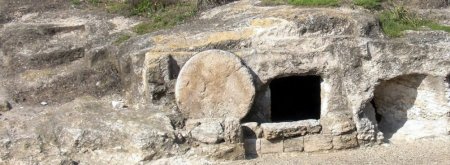Did Jesus Really Exist?
The Bible is filled with powerful and historically reliable accounts of Jesus. But I quite regularly get asked: ‘Is there any evidence for Jesus outside the Bible?’
Writer Lee Strobel once said, ‘If the Jesus of faith is not also the Jesus of history, he’s powerless and meaningless.’
We’re going to blitz through eight writers who spoke about Jesus in the first 150 years from his death. There are more than eight writers I could refer to, but I’ve chosen the most-respected non-Christian writers, as their hostile position provides particularly compelling evidence. This is going to help us slowly build up a picture.
1. Mara Bar Serapion
Mara Bar Serapion was a Syrian philosopher who wrote a letter to his son around AD 73 discussing the execution of a Jewish King. He writes:
‘What benefit did the Athenians obtain by putting Socrates to death?… Or, the people of Samos for burning Pythagoras?… Or the Jews by murdering their wise king… The wise king… lived on in the teachings he enacted.’ (Mara Bar Serapion, A Letter of Mara)
Here we learn: In the first century, there was a murdered Jewish King who lived on by his teaching.
2. Josephus
Josephus was a professional Roman-Jewish historian who references Jesus in his famous work The Antiquities of the Jews in AD 93. One text talks about Jesus performing ‘surprising deeds’ and ‘coming back from the dead’.
Whilst historians agree this text was about Jesus, many believe it’s been adjusted and isn’t fully reliable.
But in a later text, Josephus records:
[Ananus] assembled the Sanhedrin of judges, and brought before them the brother of Jesus who was called Christ, whose name was James, and some others, and when he had formed an accusation against them as breakers of the law, he delivered them to be stoned. (Antiquities 20.9.1)
Even if we discount the first controversial text, we still learn:
Jesus was called the Christ and had a brother called James.
3. Celsus
Celsus was a Greek philosopher and early opponent of Christianity.
His work The True Word survives in quotations in Against Celsus by Origen of Alexandria.
He writes:
Jesus had come from a village in Judea, and was the son of a poor Jewess who gained her living by the work of her own hands. His mother had been turned out of doors by her husband, who was a carpenter by trade, on being convicted of adultery. Being thus driven away by her husband, and wandering about in disgrace, she gave birth to Jesus, a bastard… Jesus, on account of his poverty, was hired out to go to Egypt. While there he acquired certain (magical) powers which Egyptians pride themselves on possessing. He returned home highly elated at possessing these powers, and on the strength of them gave himself out to be a god. (Celsus, The True Word: A Discourse Against Christians)
Here we learn: Jesus was the son of a village carpenter with a scandalous birth story. He became a refugee in Egypt. He possessed amazing powers and called himself God.
4. Tacitus
Publius Cornelius Tacitus is one of the most famous and trusted ancient historian. He is known for his careful analysis of historical documents and is responsible for much of what we know about ancient Rome. In the Annals of Imperial Rome, he writes:
Nero fabricated scapegoats and punished with every refinement the notoriously depraved Christians (as they were popularly called). Their originator, Christ, had been executed in Tiberius’ reign by the governor of Judea, Pontius Pilate. But in spite of this temporary setback the deadly superstition had broken out afresh, not only in Judea (where the mischief had started) but even in Rome…
Nero had self-acknowledged Christians arrested. Then, on their information, large numbers of others were condemned… Their deaths were made farcical. Dressed in wild animals’ skins, they were torn to pieces by dogs, or crucified, or made into torches to be ignited after dark as substitutes for daylight. Nero provided his gardens for the spectacle. (The Annals, Book 15, chapter 44).
This one really is astonishing. When tyrannical regimes try to silence something, it’s worth checking out.
Here we learn: Christ was executed under Tiberius Caesar and Pontius Pilate.
5. Phlegon of Tralles
Phlegon was a Greek writer whose work partially survives through historians – Origen and Africanus.
Interestingly, Phlegon documents both the eclipse and earthquakes that took place at the time of Jesus’ crucifixion.
Origen writes:
‘With regard to the eclipse in the time of Tiberius Caesar, in whose reign Jesus appears to have been crucified, and the great earthquakes which then took place, Phlegon too, I think, has written in the thirteenth or fourteenth book of his Chronicles.’ (Origen, Against Celsus, Book 2, Chapter 33).
Africanus confirms: ‘Phlegon records that, in the time of Tiberius Caesar, at full moon, there was a full eclipse of the sun from the sixth to the ninth hour.’ – (Africanus, Chronography, 18:1).
Africanus also quotes Thallus – an early historian who wrote in the 50s AD – saying:
In the third book of his History, Thallus calls this darkness a ‘solar eclipse’… But an eclipse of the sun… cannot happen at any other time but in the interval between the first day of the new moon and the last of the old… So how is an eclipse supposed to happen when the moon is almost diametrically opposite the sun? (Africanus, Chronography 18:1).
Here we see several early historians wrestling with the impossible midday darkness the gospels tell us occurred at Jesus’ crucifixion.
Here we learn: A mysterious eclipse and earthquake occurred around the time of his crucifixion.
6. Pliny the Younger
Pliny the Younger was a Roman Senator and friend of the Roman Emperor, Trajan.
Amazingly, we have letters he exchanged with the Emperor where he talks about trying to stamp out Christianity while he was governor of the Roman province of Bithynia. He writes:
This is the line I have taken with all persons brought before me on the charge of being Christians. I have asked them in person if they are Christians, and if they admit it, I repeat the question a second and third time, with a warning of the punishment awaiting them. If they persist, I order them to be led away for execution… There have been others similarly fanatical who are Roman citizens…
The sum total of their guilt or error amounted to no more than this: they had met regularly before dawn on a fixed day to chant verses alternately amongst themselves in honour of Christ as if to a god…
This made me decide it was all the more necessary to extract the truth by torture from two slave-women… A great many individuals of every age and class, both men and women, are being brought to trial, and this is likely to continue. It is not only the towns, but villages and rural districts too… I think though that it is still possible for it to be checked and directed to better ends.’ (Pliny the Younger, Letters, Book 10, 96).
When countless men and women, Roman and Greek, slave and free, are all willing to be tortured and killed to pass on the truth of the resurrection – that should grab our attention.
Here we learn: Christians of every demographic met to sing to Christ as God. Many Christians were willingly tortured and killed for Christ.
7. Suetonius
Suetonius was another first-century Roman historian. He records the exile of the Jews from Rome: ‘Because the Jews at Rome caused continuous disturbances at the instigation of Chrestus, [Claudius] expelled them from the city.’ (Suetonius, Life of Claudius, 25:4). This event is also referred to in the Bible, in Acts 18.
Here we learn: The Jews were kicked out of Rome because of Christ.
8. Lucian of Samosata
Lucian of Samosata is an ancient Greek satirist. He hated Christians which makes him good source material.
He wrote:
The Christians, you know, worship a man to this day – the distinguished personage who introduced their novel rites, and was crucified on that account…
You see, these misguided creatures start with the general conviction that they are immortal for all time, which explains their contempt of death and voluntary self-devotion…
It was impressed on them by their original lawgiver that they are all brothers, from the moment that they are converted, and deny the gods of Greece, and worship the crucified sage, and live after his laws. All this they take quite on faith, with the result that they despise all worldly goods alike, regarding them merely as common property.’ (Lucian, 'The Death of Peregrine' in Dialogues of the Hetaerae, 11–13.
Here we learn: Christians worshipped a crucified man, yet were fearless of death, considered themselves family, and shared everything they had.
Conclusion
By piecing together these eight early accounts, all taken from outside the Bible, all written by Jesus’ opponents, we have a pretty comprehensive picture of what happened. And there are many more historic documents.
There are of course the eyewitness accounts in the Bible: Matthew, Mark, Luke, John, Paul, Peter and others.
There are early Christian writings, like Polycarp, Clement, Ignatius, Barnabus, Justin Martyr.
There are lots of later writers who discuss the history of the church in the first hundred years: Augustine, Eusebius. To put this into context, very few records actually survive from 2,000 years ago. Tiberius Caesar is one of the most famous ancient figures. In the first 150 years after his death, we have around 40–45 documents that mention him, and historians consider that very strong evidence.
Remarkably, we currently have 42 unique, early, surviving texts about Jesus. The same as the Emperor of Rome!
Even Atheist scholar Bart Ehrman concludes that we cannot deny what ‘virtually every sane historian on the planet – Christian, Jewish, Muslim, pagan, agnostic, atheist, what have you – has come to conclude based on a range of compelling historical evidence. Whether we like it or not, Jesus certainly existed.’[1]
Some scholars go one step further. The old Lord Chief of Justice Charles Darling wrote:
‘There exists such overwhelming evidence, positive and negative, factual and circumstantial, that no intelligent jury in the world could fail to bring in a verdict that the resurrection story is true.’[2]
Thomas Arnold, an old Professor of History at Oxford University, world famous for his three volume history of Rome, wrote:
‘No one fact in the history of mankind is proved by better and fuller evidence of every sort than the fact that Christ died and rose from the dead.’[3]
When I discovered Jesus was a real person it blew my mind. The historicity of Jesus was what compelled me to look further into this man who claimed to be God, who others claimed rose from the dead, who went on to change the world with his offer of truth and life. This video isn’t seeking to persuade you to follow Jesus.
But simply to show that we can’t write him off as fiction. The Jesus of faith is also the Jesus of history. Perhaps the more interesting question is: Who do you say he is?
References
[1] Bart D Ehrman, ‘Did Jesus Exist?’ Huff Post Mar 20 2012 (Updated May 20, 2012)
[2] Ed: The source for this quote is unclear, though it is likely genuine. Read more about this here: https://www.paulbeasleymurray.com/2012/04/12/evidence-for-the-resurrection/
[3] Thomas Arnold, Christian Life, Its Hopes, Its Fears, and Its Close, 6th ed. (London: T. Fellowes, 1859), pp. 15-16



